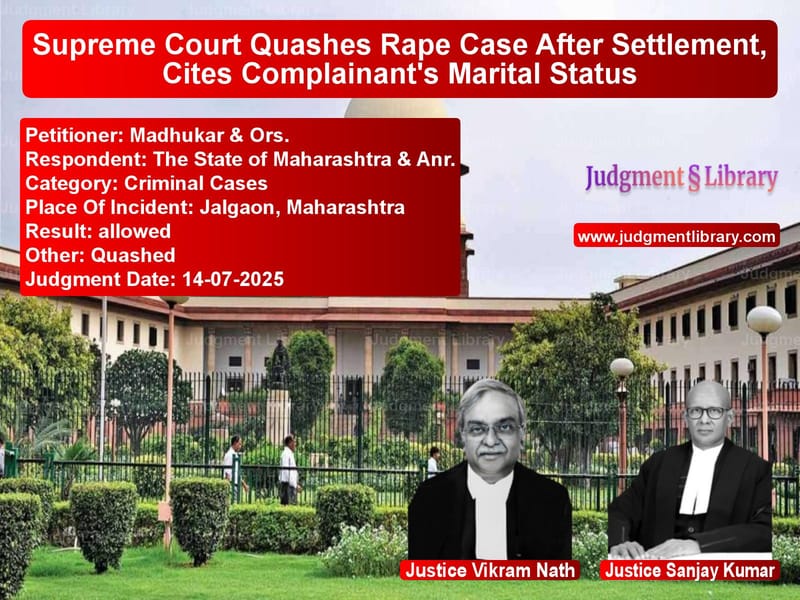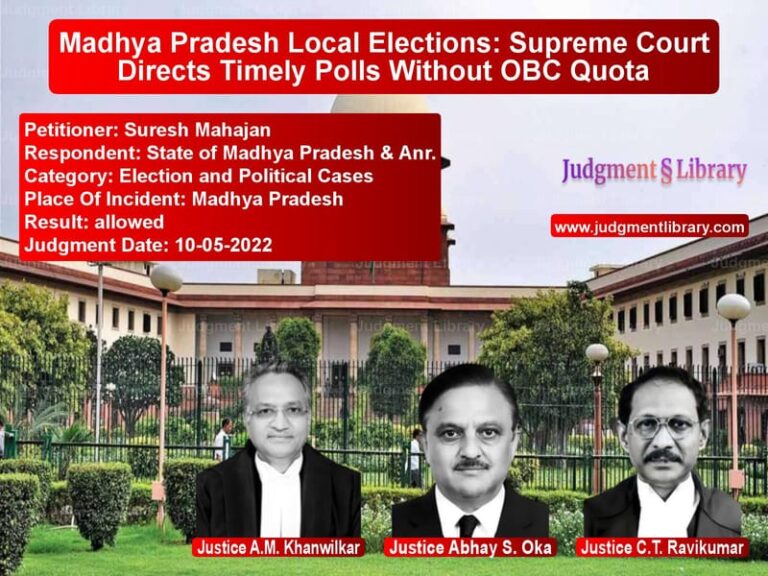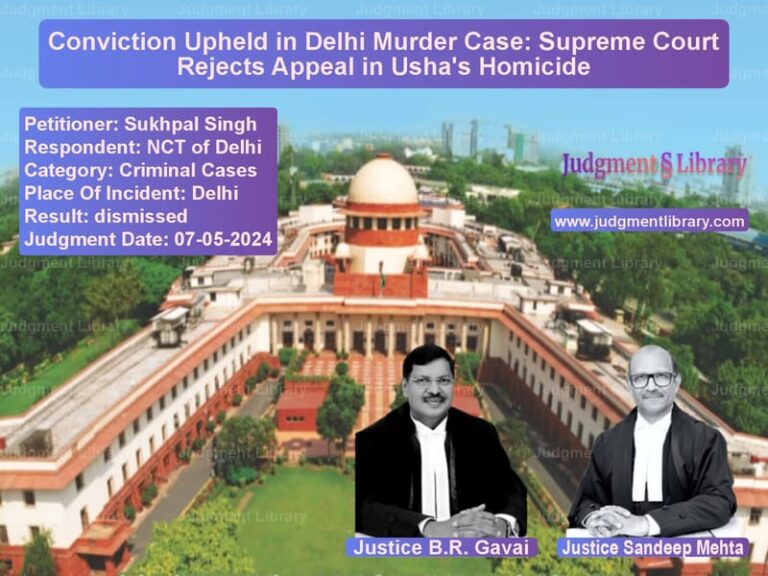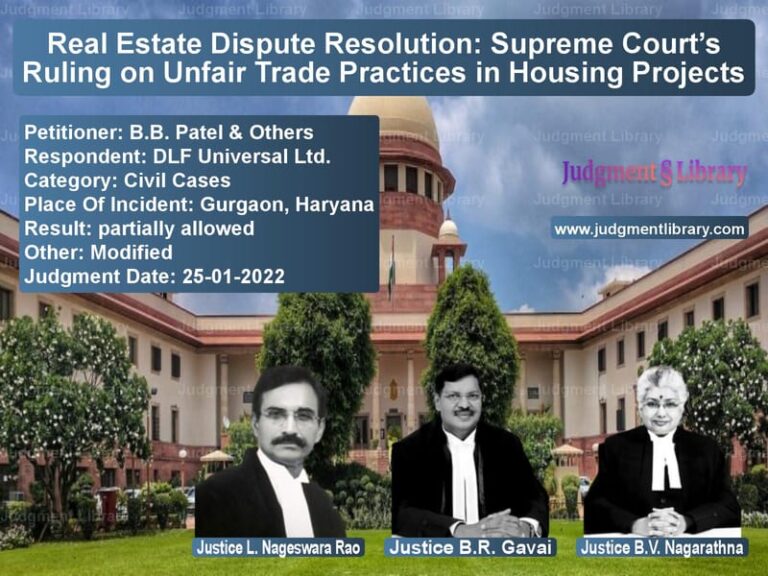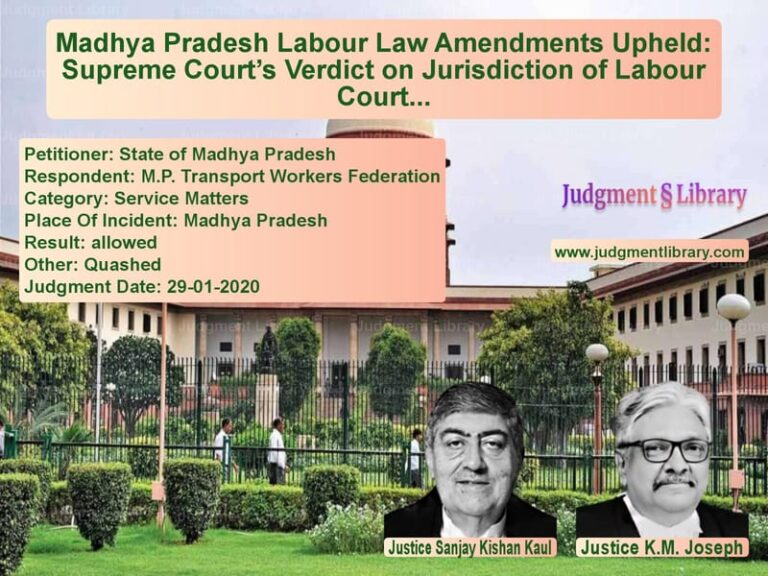Supreme Court Quashes Rape Case After Settlement, Cites Complainant’s Marital Status
In a significant ruling that balances the gravity of sexual offense allegations with the practical realities of settlement and the complainant’s current life circumstances, the Supreme Court has quashed criminal proceedings in a rape case where the parties had reached an amicable settlement and the complainant had moved on with her life. The case involved Madhukar and others as appellants challenging the Bombay High Court’s refusal to quash FIRs containing serious allegations including rape, sexual assault, and criminal intimidation.
The legal battle began with two FIRs registered at Mehunbare Police Station in Jalgaon district, Maharashtra. The first FIR, registered on November 20, 2023, alleged that the appellants formed an unlawful assembly and assaulted the complainant and her family members. The second FIR, filed the very next day, contained grave allegations against Prabhakar (one of the appellants) including charges under Section 376 (rape), 354-A (sexual harassment), 354-D (stalking), 509 (word, gesture or act intended to insult the modesty of a woman), and 506 (criminal intimidation) of the Indian Penal Code.
The Sequence of Events and Settlement
The case took a dramatic turn in March 2024 when the complainant in the second FIR filed an affidavit before the High Court expressing her desire not to pursue the prosecution. She stated that she had no objection to granting bail to the accused and affirmed that the matter had been amicably resolved. Significantly, she disclosed that she had received Rs. 5,00,000 towards marriage-related expenses as part of the settlement.
Based on this development, the appellants moved the High Court under Section 482 of the Code of Criminal Procedure seeking quashing of both FIRs. However, the High Court rejected their applications, holding that an offense under Section 376 IPC being of a serious and non-compoundable nature could not be quashed merely on the basis of a settlement or monetary compensation.
The Supreme Court’s Consideration
Before the Supreme Court, both parties categorically stated that they had resolved their disputes amicably and were desirous of moving on with their lives. The Court noted that the complainant in the second FIR was now married and residing with her husband. She expressed that continuation of the prosecution would cause further disruption in her personal life and that she had no wish to support the charges or pursue the matter any further.
The Supreme Court, comprising Justices Vikram Nath and Sanjay Kumar, began its analysis by acknowledging the gravity of the offenses involved. The Court stated: “At the outset, we recognise that the offence under Section 376 IPC is undoubtedly of a grave and heinous nature. Ordinarily, quashing of proceedings involving such offences on the ground of settlement between the parties is discouraged and should not be permitted lightly.”
The Court’s Reasoning for Quashing
However, the Court emphasized that “the power of the Court under Section 482 CrPC to secure the ends of justice is not constrained by a rigid formula and must be exercised with reference to the facts of each case.”
The Court identified several crucial factors that distinguished this case from ordinary situations where quashing might be inappropriate. First, the Court noted the timing of the FIRs: “In the present matter, we are confronted with an unusual situation where the FIR invoking serious charges, including Section 376 IPC, was filed immediately following an earlier FIR lodged by the opposing side. This sequence of events lends a certain context to the allegations and suggests that the second FIR may have been a reactionary step.”
Second, and more importantly, the Court emphasized the complainant’s unequivocal position: “More importantly, the complainant in the second FIR has unequivocally expressed her desire not to pursue the case. She has submitted that she is now married, settled in her personal life, and continuing with the criminal proceedings would only disturb her peace and stability. Her stand is neither tentative nor ambiguous, she has consistently maintained, including through an affidavit on record, that she does not support the prosecution and wants the matter to end.”
The Court further reasoned that “The parties have also amicably resolved their differences and arrived at a mutual understanding. In these circumstances, the continuation of the trial would not serve any meaningful purpose. It would only prolong distress for all concerned, especially the complainant, and burden the Courts without the likelihood of a productive outcome.”
The Final Decision
In its conclusive reasoning, the Court held: “Therefore, having considered the peculiar facts and circumstances of this case, and taking into account the categorical stand taken by the complainant and the nature of the settlement, we are of the opinion that the continuation of the criminal proceedings would serve no useful purpose and would only amount to abuse of process.”
Accordingly, the Supreme Court allowed the appeals, set aside the High Court’s order, and quashed both FIR No. 302 of 2023 and FIR No. 304 of 2023, along with all proceedings arising therefrom, including Sessions Case No. 29 of 2024.
Broader Implications
This judgment represents a nuanced approach to criminal justice, particularly in cases involving serious offenses where the parties have genuinely reconciled. While the Court reaffirmed that sexual offenses are grave matters that should not be quashed lightly, it also recognized that in exceptional circumstances where the complainant has moved on with her life and unequivocally desires closure, forcing her to undergo the trauma of a trial might cause more harm than good.
The decision underscores that the power under Section 482 CrPC to prevent abuse of process and secure the ends of justice must be exercised based on the specific facts of each case. The Court’s consideration of the complainant’s current marital status and her desire for peace and stability reflects a humane approach that balances legal principles with practical realities.
However, the judgment also serves as a reminder that such quashing in serious cases remains exceptional rather than routine. The Court’s careful analysis of the sequence of events, the timing of the FIRs, and the complainant’s consistent and unequivocal stance demonstrates the high threshold that must be met for quashing proceedings in cases involving serious non-compoundable offenses.
This ruling will likely influence how courts approach similar situations where parties have reached settlements in cases involving serious allegations, particularly when the complainant has genuinely moved on with life and continuation of proceedings would cause unnecessary distress without serving any meaningful purpose of justice.
Petitioner Name: Madhukar & Ors..Respondent Name: The State of Maharashtra & Anr..Judgment By: Justice Vikram Nath, Justice Sanjay Kumar.Place Of Incident: Jalgaon, Maharashtra.Judgment Date: 14-07-2025.Result: allowed.
Don’t miss out on the full details! Download the complete judgment in PDF format below and gain valuable insights instantly!
Download Judgment: madhukar-&-ors.-vs-the-state-of-maharas-supreme-court-of-india-judgment-dated-14-07-2025.pdf
Directly Download Judgment: Directly download this Judgment
See all petitions in Rape Cases
See all petitions in Judgment by Vikram Nath
See all petitions in Judgment by Sanjay Kumar
See all petitions in allowed
See all petitions in Quashed
See all petitions in supreme court of India judgments July 2025
See all petitions in 2025 judgments
See all posts in Criminal Cases Category
See all allowed petitions in Criminal Cases Category
See all Dismissed petitions in Criminal Cases Category
See all partially allowed petitions in Criminal Cases Category

